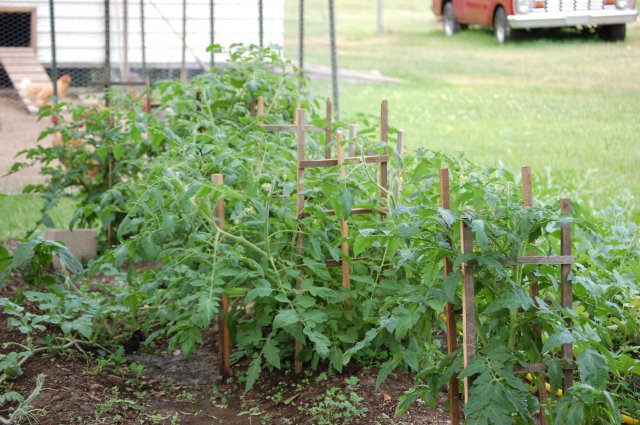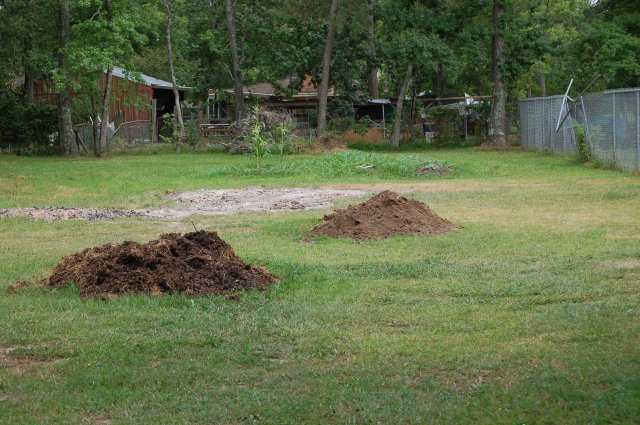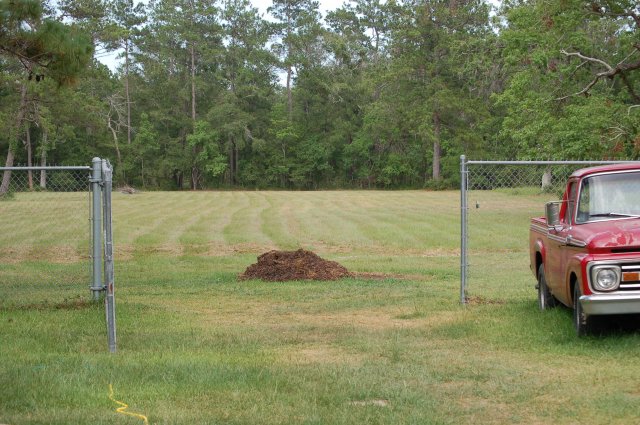

|
Share your favorite photos with us here. Instructions on how to post them can be found in the first post within.
|
 |
|
|
Thread Tools | Display Modes |
|
|
#1 |
|
Tomatovillian™
Join Date: Jun 2009
Location: Houston(ish), Texas
Posts: 95
|
Here are a few pictures. This is my first time growing anything at all. If yall see where I can improve, please point me in that direction
  
__________________
Knows nothing about tomatoes, wants to learn everything about tomatoes.Wine Maker |
|
|

|
|
|
#2 |
|
Tomatovillian™
Join Date: Oct 2008
Location: Fairfax, VA Z7
Posts: 524
|
Looks like your off to a great start. Keep us posted of your progress to ripe tomatoes. Yum
George |
|
|

|
|
|
#3 |
|
Tomatovillian™
Join Date: Jan 2007
Location: PNW
Posts: 4,743
|
Seems like your tomato stakes could be a little taller. Nice
looking plants, though.
__________________
-- alias |
|
|

|
|
|
#4 |
|
Tomatovillian™
Join Date: Jan 2008
Location: Zone 4 Lake Minnetonka, MN
Posts: 967
|
|
|
|

|
|
|
#5 |
|
Tomatovillian™
Join Date: Mar 2008
Location: SW Ohio
Posts: 1,818
|
Nice looking plants.
Is that a chicken house I see behind the tomatoes?
__________________
Barbee |
|
|

|
|
|
#6 | |||
|
Tomatovillian™
Join Date: Jun 2009
Location: Houston(ish), Texas
Posts: 95
|
Quote:
Quote:
Quote:
__________________
Knows nothing about tomatoes, wants to learn everything about tomatoes.Wine Maker |
|||
|
|

|
|
|
#7 | |
|
Tomatovillian™
Join Date: Jan 2007
Location: PNW
Posts: 4,743
|
Quote:
can till it in. If the next crop is a fall crop (if the mulch is from the spring crop), you might get some nitrogen drawdown tilling it in (straw is a high-carbon material), so one would need to add a little extra nitrogen of some kind with it, maybe a high-nitrogen amendment like grass clippings, alfalfa, etc. If the mulch was wood chips, that is a really high-carbon material, so one would need more nitrogen to compensate than for the straw (for the first year it is in the ground). A lot of people do remove it, though, because it will hold spores from fungal and bacterial foliage diseases. Removing the mulch completely from the garden area minimizes the risk of reinfecting the next crop with disease spores in the mulch. Some people don't sweat it. They figure that the chance of the spores making it up through the soil and a new layer of fresh mulch is minimal. (The spores frequently infect plants via splashback from the dirt in a hard rain. That does not happen much with fresh mulch on top of the soil.) So they just till it in and go. There are two theories on what to do with it if you do remove it. One is to move it somewhere so far from the garden that there is no chance that the spores will get carried by wind or bugs back to the next crop. You can scatter it over pasture, or under trees, somewhere where you still get some benefit from the organic matter in it as it breaks down. The other theory is to mix it into a compost pile, so that the compost will build up a population of organisms that prey on the disease spores or organisms, kind of like creating a vaccine in the compost against that particular disease, that will be incorporated into the garden as the compost is mixed in. With plants that sprawl, rather than being staked or caged up vertically, mulch helps protect ripening fruit against disease organisms in the soil.
__________________
-- alias |
|
|
|

|
|
|
#8 |
|
Tomatovillian™
Join Date: Dec 2008
Location: east texas
Posts: 686
|
You are off to a great start. It maybe beginners luck----
 but the plants look healthy and I think you are on the right track. I'm fairly new to this myself so the more seasoned gardeners will have to help with any problems you might have. but the plants look healthy and I think you are on the right track. I'm fairly new to this myself so the more seasoned gardeners will have to help with any problems you might have. I say just have fun and enjoy  neva |
|
|

|
|
|
#9 | ||
|
Tomatovillian™
Join Date: Jun 2009
Location: Houston(ish), Texas
Posts: 95
|
Quote:
 I've noticed that some of my leaves touch the ground, do I need to remove those particular branches, I see it alot in the tomato plants that I have in planters that I've built. Quote:
I am currently looking for a good tiller for my tractor. This is the field that I am going to till up this fall for my spring 2010 garden. Right now I have four garden bed around my main yards. I figure I might as well put that back pasture to use instead of having to brush hog it all the time 
__________________
Knows nothing about tomatoes, wants to learn everything about tomatoes.Wine Maker Last edited by Mjdtexan; June 10, 2009 at 08:33 AM. Reason: loves pork spare ribs with a pineapple jabenero glaze |
||
|
|

|
|
|
#10 |
|
Tomatovillian™
Join Date: Mar 2008
Location: SW Ohio
Posts: 1,818
|
I wanna hear more about the wine

__________________
Barbee |
|
|

|
|
|
#11 |
|
Tomatovillian™
Join Date: Jun 2009
Location: Houston(ish), Texas
Posts: 95
|
Well, currently I am making Hard Apple Cider (the neighborhood favorite around here), Strawberry wine, Blackberry wine, Strawberry/Banana wine and I am making a nice Blackberry Cabernet for the more sophisticated wine palates around here.
I actually have to start 3 or more gallons of Hard Apple Cider every three weeks to keep folks satisfied around the neighborhood. Whats really funny is that my ex wife drank ALOT of wine. She would be mad to know that I have a wine closet now with gallons and gallons of the stuff. I didnt like wine, we've not yet been divorced a year yet. She's gonna be mad.
__________________
Knows nothing about tomatoes, wants to learn everything about tomatoes.Wine Maker |
|
|

|
|
|
#12 |
|
Tomatovillian™
Join Date: Jan 2009
Location: iowa
Posts: 31
|
Nice garden, I like the red pickup! :-)
__________________
rod |
|
|

|
|
|
#13 |
|
Tomatovillian™
Join Date: Jun 2009
Location: Houston(ish), Texas
Posts: 95
|
Thank You. 63 Ford. Runs well
__________________
Knows nothing about tomatoes, wants to learn everything about tomatoes.Wine Maker |
|
|

|
|
|
#14 |
|
Tomatovillian™
Join Date: Jan 2007
Location: PNW
Posts: 4,743
|
If you mulch with straw, you can fork it into the manure piles
after the plants are done. Composting manure that far in advance, the straw will be well-composted, too, by the time you use it, and carbon-nitrogen issues will have been resolved by then. Hay is good stuff, too, it is simply usually more weedy (higher seed content than straw). I like it better for a compost ingredient than for mulch. If you mow that field that you intend to till up, it looks like you would have a wealth of grass clippings there. Grass clippings are an excellent mulch that does not have any nitrogen drawdown issues when tilled in after a crop. (Works well in a compost pile if you remove it after a crop, too.)
__________________
-- alias |
|
|

|
|
|
#15 | |
|
Tomatovillian™
Join Date: Jun 2009
Location: Houston(ish), Texas
Posts: 95
|
Quote:
Thank You for the advice.
__________________
Knows nothing about tomatoes, wants to learn everything about tomatoes.Wine Maker |
|
|
|

|
 |
| Thread Tools | |
| Display Modes | |
|
|
